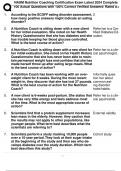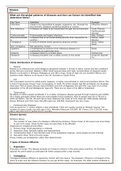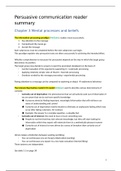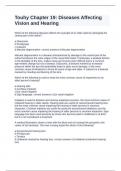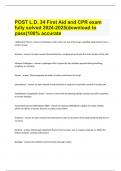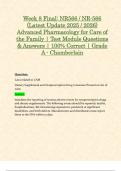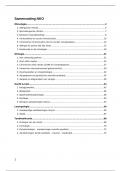COM2604 Assignment 1
Semester 2 2024
(817738) - DUE 21 August
2024
[Company address]
,COM2604 Assignment 1 Semester 2 2024 (817738) - DUE 21 August 2024
QUESTION 1
STUDY UNIT 3
Approaches to the study of mass communication When we attempt to describe,
interpret, evaluate and predict a phenomenon, in this case mass communication,
understanding said phenomenon is key. Various factors influence this.
1.1 In a short paragraph, present a well-formulated definition of mass communication
using your own examples to substantiate your answer. (5)
1.2 Further to the above, there are various perspectives on mass communication.
Briefly mention each of these and their specific emphasis. (5)
1.3 The theoretical approach you use also holds certain implications for your
understanding of mass communication. Briefly discuss the main characteristics of the
two approaches listed below:
1.3.1 The technological determinism approach. (5)
1.3.2 The poststructionalist/postmodern approach. (5) [TOTAL 20]
1.1 Definition of Mass Communication
Mass communication refers to the process of creating, sending, receiving, and
analyzing messages to large audiences through various forms of media. This process
involves the use of technology to disseminate information to a widespread audience
quickly and efficiently. For example, when a television station broadcasts the evening
, news, it reaches millions of viewers simultaneously, conveying information about current
events, weather, and sports. Similarly, social media platforms like Twitter allow users to
share updates and opinions with followers globally, demonstrating the wide reach and
influence of mass communication.
1.2 Perspectives on Mass Communication
1. Transmission Perspective: Emphasizes the delivery of information from a
sender to a receiver. It focuses on how messages are transmitted and the effects
they have on the audience.
2. Ritual Perspective: Views communication as a cultural practice that shapes and
maintains societal values and beliefs. It focuses on the role of media in creating a
shared experience.
3. Publicity Perspective: Focuses on the ways media can attract and hold public
attention, highlighting the role of mass communication in promoting individuals,
products, and ideas.
4. Reception Perspective: Examines how audiences interpret and make sense of
media messages. It emphasizes the active role of audiences in decoding and
understanding media content.
5. Critical Perspective: Analyzes the power structures and ideologies embedded
in media content. It critiques the ways mass communication can perpetuate
social inequalities and influence public opinion.
1.3 Theoretical Approaches to Mass Communication
Semester 2 2024
(817738) - DUE 21 August
2024
[Company address]
,COM2604 Assignment 1 Semester 2 2024 (817738) - DUE 21 August 2024
QUESTION 1
STUDY UNIT 3
Approaches to the study of mass communication When we attempt to describe,
interpret, evaluate and predict a phenomenon, in this case mass communication,
understanding said phenomenon is key. Various factors influence this.
1.1 In a short paragraph, present a well-formulated definition of mass communication
using your own examples to substantiate your answer. (5)
1.2 Further to the above, there are various perspectives on mass communication.
Briefly mention each of these and their specific emphasis. (5)
1.3 The theoretical approach you use also holds certain implications for your
understanding of mass communication. Briefly discuss the main characteristics of the
two approaches listed below:
1.3.1 The technological determinism approach. (5)
1.3.2 The poststructionalist/postmodern approach. (5) [TOTAL 20]
1.1 Definition of Mass Communication
Mass communication refers to the process of creating, sending, receiving, and
analyzing messages to large audiences through various forms of media. This process
involves the use of technology to disseminate information to a widespread audience
quickly and efficiently. For example, when a television station broadcasts the evening
, news, it reaches millions of viewers simultaneously, conveying information about current
events, weather, and sports. Similarly, social media platforms like Twitter allow users to
share updates and opinions with followers globally, demonstrating the wide reach and
influence of mass communication.
1.2 Perspectives on Mass Communication
1. Transmission Perspective: Emphasizes the delivery of information from a
sender to a receiver. It focuses on how messages are transmitted and the effects
they have on the audience.
2. Ritual Perspective: Views communication as a cultural practice that shapes and
maintains societal values and beliefs. It focuses on the role of media in creating a
shared experience.
3. Publicity Perspective: Focuses on the ways media can attract and hold public
attention, highlighting the role of mass communication in promoting individuals,
products, and ideas.
4. Reception Perspective: Examines how audiences interpret and make sense of
media messages. It emphasizes the active role of audiences in decoding and
understanding media content.
5. Critical Perspective: Analyzes the power structures and ideologies embedded
in media content. It critiques the ways mass communication can perpetuate
social inequalities and influence public opinion.
1.3 Theoretical Approaches to Mass Communication

